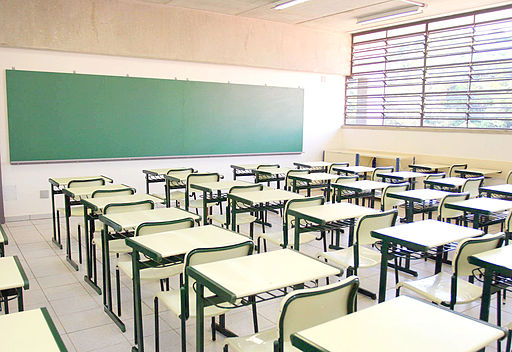Going to school in Portuguese – Part I Posted by carol on Feb 28, 2018 in Culture, Customs, Learning, Spelling, Vocabulary
Boa noite a todos! Good evening to all!
Fevereiro (February) is about to be over, meaning that, in Brazil, students have been back to school for about a month (except for most federal universities, whose classes resume in march). Here, the school year begins in the first week of fevereiro and end around the second week of dezembro (December), with a 15-day break in julho (July). It is with a back-to-school spirit that you’ll learn today’s lesson about common words to refer to the school place, be it the university or a secondary school. Since this blog is mainly about language, education and culture, I’m sure many of you probably have or still are experiencing the classroom as an important part of your study and development. So grab a seat and let’s hit the books!
ano letivo – school year
- Nos Estados Unidos, o ano letivo costuma começar em setembro – In the USA, the school year usually starts in September
semestre – semester/ term
- Mal posso esperar para esse semestre acabar! – I can’t wait for this term to be over!
aula – class
- Preciso sair agora, senão vou me atrasar para a aula – I need to leave now or I’ll be late for class
- A aula de francês de hoje foi cancelada – Today’s French class was cancelled
carteira – desk
- As carteiras na sala estão organizadas em cinco fileiras – The desks in the room are arranged in five rows
mesa – table
- A professora disse para deixar as provas na mesa dela ao terminarmos – The teacher said we should leave the test on her table when we’re done
cadeira – chair
- Você pode ir buscar uma cadeira para o aluno novato? – Can you get a chair for the new student?
quadro – board
- O professor escreveu o nome dele no quadro – The teacher wrote his name on the board
alunos – students
- Alunos não devem usar seus aparelhos telefônicos durante a aula – Students should not use their mobile phones during class
colegas – classmates
- Você se dá bem com seus colegas? – Do you get along with your classmates?
professor(a) – teacher
- Professores precisam sempre inspirar seus alunos – Teachers always need to inspire their students
- A professora me tirou de sala – The teacher told me to leave the classroom
universidade – university
- Em que universidade o escritor estudou? – Which university did the writer go to?
- A Universidade de São Paulo é uma das melhores do Brasil – The University of São Paulo is one of the best in Brazil
ensino médio – high school
- O ensino médio é uma fase crucial para a formação dos alunos – High school is an essential stage for students’ formation
chamada – attendance
- Você sabe se o professor já fez chamada hoje? – Do you know if the professor has already taken attendance today?
dever de casa – homework
- Só vai assistir televisão depois de terminar o dever de casa – You can’t watch TV after you’re done with homework
- O professor de matématica sempre passa muito dever de casa pra gente – The math teacher always sets a lot of homework for us
trabalho – assignment
- Vou encontrar meus amigos na biblioteca para fazer o trabalho sobre a camada de ozônio – I’m meeting my friends at the library to do the assignment on the ozone layer
ler – read
- Carlos, você pode ler o parágrafo em voz alta para a gente? – Carlos, can you read the paragraph out loud for us?
- Você leu o livro que a professora pediu? – Did you read the book the professor asked us to?
escrever – write
- Não se esqueçam de escrever seus nomes nos trabalhos – Don’t forget to write your names on the assignments
estudar – study
- Prometo estudar mais semestre que vem – I promisse to study harder next semester!
Aguardem mais semana que vem! There is more to come next week!

Build vocabulary, practice pronunciation, and more with Transparent Language Online. Available anytime, anywhere, on any device.





Comments:
Joy Seymour:
Just a few comments regarding various items. All English months should be capitalized. Instead of ON March, it should be IN March. Need an S on ends. Caps for December and July. Now, for about five English sentences a period is required at the end of the sentence. There seems to be plenty of question and exclamation marks. Oh, promise is misspelled. Hope this helps you. JES
carol:
@Joy Seymour Thanks for the heads up, Joy! It’s fixed now.
Dave:
@carol This is a portuguese blog so I don’t think it matters. Thank you so much Carol.
carol:
@Dave Thank you, Dave! Thanks for reading our blog.
carol:
@carol Hello, Tristian! I appreciate your interest.
We just posted new content, check it out!
Hope you like it